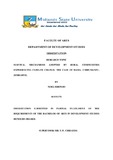Please use this identifier to cite or link to this item:
https://cris.library.msu.ac.zw//handle/11408/3571| Title: | Survival mechanisms adopted by rural communities experiencing climate change: the case of Hama, Chirumanzu, Zimbabwe. | Authors: | Mbondo, Noel | Keywords: | Climate change Survival mechanisms |
Issue Date: | 2018 | Publisher: | Midlands State University | Abstract: | This research serves the purpose of revealing the survival mechanisms or response strategies that Hama community employed amidst of climate change manifestation. The study delved the various key segments namely environment, agriculture, water, health and energy which are important for human survival highlighted in the Zimbabwe National Climate Change Response Strategy (ZNCCRS, 2013). The research encompassed two crucial elements with regards to survival mechanisms adopted by the community, that is, climate change adaptation and mitigation. Adaptation involves coping or surviving of a population experiencing climate change while mitigation encompasses reduction or minimizing the occurrence of climate change manifestation which can also mean prevention. The study was motivated by the increase in global alarm with regards to climate change and the desire to improve livelihoods especially in the African continent with less adaptive capacity. Qualitative approach was employed to explain or give detail to the effects of climate change through interview and questionnaires as well as observation. Considering that the community receives little government and NGO support, community participation is imperative with regards to the strategies that are employed in response to climate change. Indigenous Knowledge Systems are a key component in rural people’s response to climate change due to lack of real knowledge about climate change, hence there is conscious and unconscious response. Programming solutions to improve the lives of local people were suggested. Chief of them all is the need for serious government intervention to reduce the burden or responsibility of local people to respond to climate change on their own. To ensure resilience and sustainability, there is need to make use of local people’s skills and knowledge about their environment to enhance participation for the betterment of livelihoods. | URI: | http://hdl.handle.net/11408/3571 |
| Appears in Collections: | Bachelor Of Arts In Development Studies Honours Degree |
Files in This Item:
| File | Description | Size | Format | |
|---|---|---|---|---|
| Noel final piece.pdf | Full Text | 1.06 MB | Adobe PDF |  View/Open |
Page view(s)
326
checked on Jan 10, 2026
Download(s)
236
checked on Jan 10, 2026
Google ScholarTM
Check
Items in MSUIR are protected by copyright, with all rights reserved, unless otherwise indicated.



